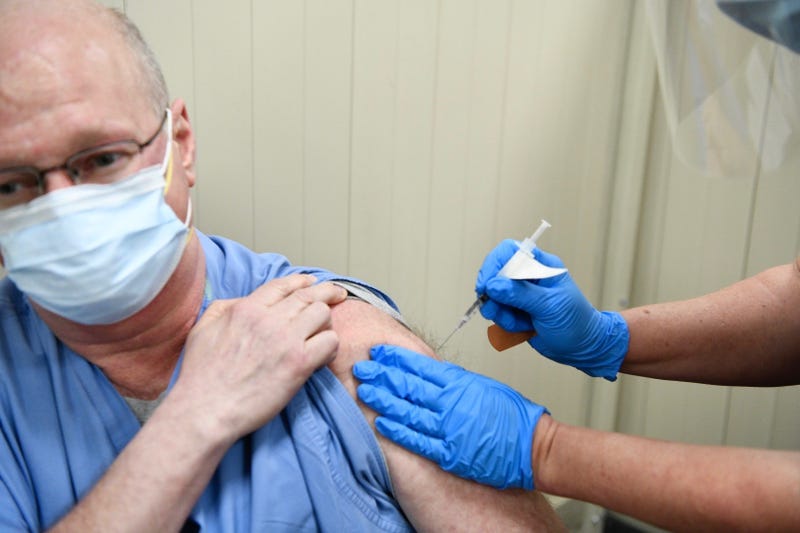
BUFFALO, N.Y. (WBEN) – A letter written in the New England Journal of Medicine suggests prioritizing the first dose of the Moderna vaccine to the masses before a second dose. However, health experts warn that the letter should not be taken as gospel.
“That correspondence to the New England Journal was a sub-analysis of the data submitted to the FDA,” Dr. Ken Snyder, an Associate Professor of Neurosurgery at Jacobs School of Medicine and Vice President of Physician Quality at Kaleida Health, said. “Whenever you look at data that wasn’t part of the primary outcome of a trial, you have to be very careful about quoting it as perfectly reproducible.”
The letter was published last Wednesday by two Canadian doctors. Because the first dose of Moderna’s COVID-19 vaccine is 92.1% effective, the letter suggests temporarily using only first doses of Moderna’s vaccine until supply issues are resolved.
“There may be uncertainty about the duration of protection with a single dose, but the administration of a second dose within 1 month after the first, as recommended, provides little added benefit in the short term, while high-risk persons who could have received a first dose with that vaccine supply are left completely unprotected,” the letter read. “Given the current vaccine shortage, postponement of the second dose is a matter of national security that, if ignored, will certainly result in thousands of COVID-19 –related hospitalizations and deaths this winter in the United States – hospitalizations and deaths that would have been prevented with a first dose of vaccine.”
The second dose of Moderna’s vaccine is 94.8% effective at preventing serious illness from COVID-19. Pfizer’s COVID-19 vaccine is 52.4% effective after the first dose and 92.6% effective after a second dose.
Snyder said UK studies on the Astrazeneca vaccine analyzed timing of the second dose of a vaccine, something that was not done on Pfizer and Moderna vaccine studies.
“Yes, when you do the analysis a couple weeks after the first dose, you see a high degree of efficacy moving forward, two weeks after the first dose for both Moderna in the FDA submission and in the Pfizer,” Snyder said. “…All those should do for us is raise a question about ‘boy we should look more closely at that and validate that’.”
Dr. John Sellick, a Professor of Medicine at the University at Buffalo and epidemiologist at Kaleida Health, agreed with Snyder, saying the letters were based on “fuzzy numbers” and not brand new numbers from a well-done study.
“We have to be very careful extrapolating from a re-analysis of sub-groups from the original studies or these uncontrolled, just checking and seeing what some patients have shown, which is what happened in the study from Israel,” Sellick said. “This is not as simple as someone picking up the watch words that (said) ‘This works really great after one dose, let’s just give one’.”
Sellick said there have been some rebuttals to the letter.
In the big picture, all doctors we spoke with for this story said getting the vaccine is important in the fight against COVID-19. The two-dose vaccine differs from a one-dose because it primes the body with the first dose while the second dose gives the body for extra protection from the virus. A one-dose vaccine like Johnson & Johnson’s is different in the way that the body responds.
“Johnson & Johnson is now doing a two-dose study now that they’ve got this big pile of data from the single-dose study,” Sellick said. “They’re not undertaking a fairly large two-dose study. It may turn out that one requires two doses as well….Don’t be surprised if all of these wind up being a two-dose vaccine.”
Despite the majority of the population’s desire to get the vaccine, there is still a significant population that does not want to receive it. For example, Governor Andrew Cuomo said all nursing home residents and staff were offered the vaccine and only 73% of residents accepted it. Dr. Thomas Russo, Chief of Infectious Diseases at Jacobs School of Medicine, said it’s disappointing there’s not a more enthusiastic embrace of the vaccine.
“These RNA vaccines are extraordinary,” he said. “They’re highly efficacious. They’re quite safe with today being no serious safety signals other than those immediate allergic reactions in a very small number of individuals, which are very effectively managed without (issue) at our vaccine sites. Over 40 million doses have been administered at this point.”
The FDA will discuss the Johnson and Johnson COVID-19 vaccine this Friday.
